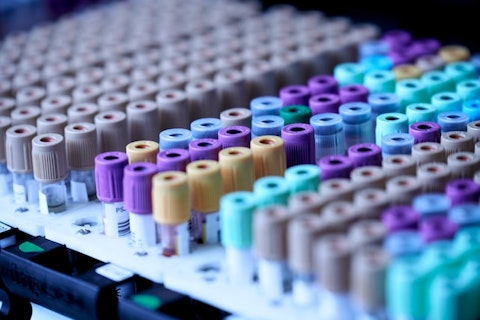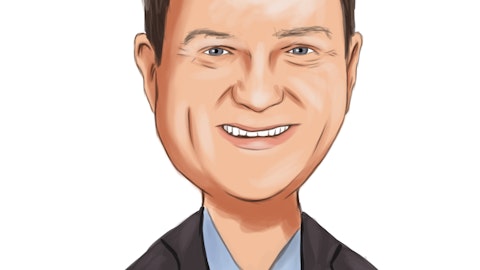Evelo Biosciences, Inc. (NASDAQ:EVLO) Q4 2022 Earnings Call Transcript March 16, 2023
Operator: Good morning and welcome to the Evelo Biosciences Conference Call to discuss its Fourth Quarter and Full Year 2022 Financial Results and Business Update. Please be advised this call is being recorded at the company’s request. At this time, I’d like to turn the call over to Shamira Shariffudin of Evelo. Please proceed.
Shamira Shariffudin: Thank you. This morning, we issued our fourth quarter and full year 2022 financial results and business update. These releases available at evelobio.com under the Investors tab. Today on the call we have Simba Gill, Chief Executive Officer; Marella Thorell, Chief Financial Officer; and Mark Bodmer, Chief Scientific Officer. Before we begin, I would like to remind everyone that statements made during this conference call that do not relate to matters of historical fact, including statements about our objectives and anticipated clinical milestones, the impact of any of our product candidates and the timing and results of any clinical trials, should be considered forward-looking statements including within the meaning of the Private Securities Litigation Reform Act of 1995.
Such forward-looking statements are intended to be subject to the Safe Harbor protection provided by the Reform Act and all other applicable law. Actual results could differ materially from those indicated by the forward-looking statements due to the impact of many factors. Participants are directed to the risk factors set forth in Evelo’s annual report on Form 10-K for the period ended December 31, 2022 and the company’s other filings with the Securities and Exchange Commission. Any forward-looking statements made today speak only to Evelo’s operations as of today. Evelo disclaims any duty to provide updates to its forward-looking statements even if subsequent events cause the company’s views to change. I will now hand the call over to Simba.
Simba Gill: Thanks, Shamira. Good morning, everyone, and thank you for joining us. We wanted to spend some time reviewing our progress over 2022, our current stages and key milestones going into ’23. I’ll begin by highlighting an important advance which we announced in February, the progress of EDP2939, the first bacterial type extracellular vesicle product candidate. EDP2939 has begun dosing in patients with moderate psoriasis. EDP2939, clear safety and tolerability in healthy volunteers show therapeutic dose escalating dose stages of the Phase 1 . Psoriasis patients are now receiving EDP2939 in the Phase 2 study at the initial therapeutic dose. As far as we know, this is the first Phase 2 for an orally delivered microbial extracellular vesicle being investigated for the treatment of a systemic inflammatory disease.
We expect data from the Phase 2 study with EDP2939 to be available this year. A reminder that EDP2939 is the EV product candidate that is derived as a pure active substance from EDP1815. The science and preclinical data of EDP2939 strongly suggest the potential to drive greater efficacy than EDP1815 and pertaining safety and tolerability. Mark will review more on our extracellular vesicle program potential for EDP2939 builds on clinical experience with EDP1815. Beyond progress on our EV program, I wanted to recap a few highlights from last year. In late 2021, we reported that our Phase 2 mild to moderate psoriasis study on EDP1815 significantly versus placebo at the end of the 16-week treatment period. PASI-50 or greater responses were 25% to 32% versus 12% for placebo with statistical significance of P value less than 0.05 in active cohorts.

Photo by Testalize.me on Unsplash
Into early 2022, we continue to follow patients for 24 additional weeks after they seize treatment with EDP1815 and Part B of the study. Clinical responses were maintained or even improved off treatment. Specifically, of patients in Part B with a PASI-50 response or greater maintained this response with no . Of these 45% of patients who had an initial improvement from between 50% to 75% experienced a deepening of response to PASI-75 or greater in the follow-up period. This durability of clinical effect is differentiated from standards of care, anti-inflammatory medicines. It is consistent with the mechanism of action that we have elucidated showing that SINTAX acts locally in the small intestine to activate a regulatory T-cell population.
This is a fundamental breakthrough in the treatment of inflammatory diseases, which suggests great potential for SINTAX medicines. In November 2022, we published a scientific review in Frontiers of Immunology, explaining the science behind the based on this growing understanding of the mechanism of action of SINTAX medicines. Our core EDP1815 program goal for 2022 was to advance interactions with regulators regarding a potential phase for EDP1815 in psoriasis. were completed with the FDA, EMA and MHRA over the past few months, providing a path to Phase 3. Advancing EDP1815 into Phase 3 is dependent on availability of financing prioritization. As you know, we are also investigating the potential of EDP1815 in the Phase 2 atopic dermatitis study.
The first three cohorts of this study didn’t meet primary endpoints, due to an unusually high placebo rate, which we cannot explain. The fourth cohort results using the faster release capsule are expected in the second quarter of 2023. Beyond clinical I wanted to also remind everyone of our accomplishments on the financial side in 2022. In May, 2022, we raised $79.2 million through a Registered Direct Offering with participation from key existing and new investors. In December, 2022, we refinanced our existing $45 million debt by loan agreement with Horizon Technology Finance. The three years of interest only payments followed by a two-year amortization period. I’ll now turn over to our Chief Scientific Officer and President of R&D, Mark Bodmer to more detail on our EV platform and report recent updates from our EDP2939 clinical program.
Mark Bodmer: Thank you, Simba. Bacterial Extracellular Vesicles or EVs are naturally occurring bacteria, therefore to be the main means of communication amongst bacteria, between bacteria and host cells. makes them well suited as potential drugs, engaging the small intestinal access when given orally inflammation throughout the body, and this leads to striking efficacy that has matched anti cytokine biologics and JAK inhibitors studies. As Simba mentioned, the EV product candidate EDP2939 derives from EDP1815. They’re both prepared from fermentation of the same single strain of commensal bacteria. EDP1815 microbial product prepared from a cell pellet after fermentation, EDP2939 is the EV product for . Now, EDP1815 provided proof-of-concept of the underlying SINTAX biology that drug action in the small intestine could lead to clinical benefit of result of biologics and JAK inhibitors, those were the results that Simba described earlier.
However the overall level of response that we’ve seen in clinical studies so far has actually not been as great as that . We propose that this is most likely due to limitations in the dose response that can be achieved with EDP1815. The critical factor in understanding why we expect EDP2939 to improve on EDP1815 in psoriasis is experimental evidence for the main active substance EDP1815 is the EV’s, the co-purified and the drug substance that is EDP1815, the same as well as long as microbial content. Preparations of EVs, like 2939 with cells have consistently shown higher preclinical potency of up to two orders of magnitude in preclinical experiments. for what that could mean clinically. Published dose response modeling of tofacitinib, the broad JAK inhibitor in psoriasis patients suggests there’s about fivefold range of dose from no response for the maximum response at the maximum tolerated dose.
range is actually much smaller than the range that we think we can achieve with the potency improvements between EDP2939 and the EDP1815. So the Phase 2 efficacy that Simba described that we saw with EDP1815 in the Phase 2 psoriasis study was evidence on the dose response curve for clinical response. So on the basic principles of pharmacology, the increased EDP2939 is predicted to be more than adequate for a meaningful shift up that dose response curve. EDP2939 enables the possibility of improved clinical activity while maintaining the potential for the placebo-like safety and tolerability that we saw . The two clinical developments reported last month from EDP2939 in its milestones and the progress of the product candidate. The first that Simba mentioned was the outcome of Phase 1 safety cohort of EDP2939 in the human volunteers at the initial therapeutic dose level.
The Trial Safety Review Committee determined that EDP2939 met the safety and tolerability criteria at the therapeutic dose proposed progression to Phase 2 in patients with moderate psoriasis recruitment of psoriasis patients study is not progressing well. Based on the current recruitment round, we anticipate reporting with the psoriasis results in the second half of 2023. The safety review was important. EDP2939 is differentiated from Evelo’s prior generation microbial product candidates by the higher transit potency of and the number of concentration of EVs that can be packed into a single capsule. This first safety evaluation at the proposed therapeutic dose EDP2939 with these potencies maintains for the placebo safety and tolerability we previously observed with EDP1815.
I’ll now hand back to Simba.
Simba Gill: Thanks, Mark. of the current environment for small-cap biotech at a time of bringing EDP2939 to the clinic is the culmination of years of discovery in the lab, building on our previous experience with EDP1815. Working out new modalities based on new biotechnology some challenging and some offering the potential for great advances, all I think discovery of the pharmacology of bacterial EVs as is an example of the latter, a step change in opportunity and potential value for In closing, I’d like to thank patients involved in our studies, our partners, our shareholders and our remarkable team for their commitment and efforts to enable the progress we have discussed today. I’ll now open the call for questions.
See also 12 Biggest Health Insurance Companies in the World and 10 Stocks ChatGPT Says Will Make Me Rich in 10 Years.
Q&A Session
Follow Evelo Biosciences Inc. (OTC:EVLO)
Follow Evelo Biosciences Inc. (OTC:EVLO)
Receive real-time insider trading and news alerts
Operator: Our first question comes from the line of Gary Nachman with BMO.
Gary Nachman: First, for the fourth cohort in the atopic derm trial, looking at the faster release capsule, was there anything you were able to do to modify that cohort to manage the high placebo response you saw with the first three cohorts? Or was that locked already? So is there anything you were able to do to modify it?
Simba Gill: Hi, Gary. So two things. One, we obviously have engaged very deeply with the sites at which the study has been run to ensure as much as possible that the study is being run according to protocol that patients are respecting . I raised that because one of the possible explanations for the high placebo rate could be could be off protocol use of topical steroids for example, in placebo patients. So we’ve done that. Beyond that, the study was — the fourth cohort was already underway and we .
Gary Nachman: Okay. Great. And then depending on the results of the fourth cohort, are there any other tweaks you could potentially do to the faster release capital, if necessary, if you don’t have the exact data that you’re hoping for? Or is that profile fully optimized? And if the fast release capsule looks good in atopic derm, is there anything you would need to do before using it in a Phase 3 psoriasis trial, assuming that’s still the plan?
Simba Gill: Yes. So let me take those in reverse order. If we with the faster release, there’s nothing further that we need to do to take it into the Phase 3 trial in psoriasis. In terms of whether or not it’s optimized, the clinical , as you know, remind everybody else, in humans on the release profile with the faster releases, is very positive. So we’re releasing the vast majority of product in the right place in the proximal small intestine with the current capsule release. So I think it is very well positioned. There’s only will need them.
Gary Nachman: Okay. And you guys are breaking up a little bit, but I think you had said that you wouldn’t be able to start the Phase 3 in psoriasis and so you have the appropriate financing. So maybe just comment, Simba, about partnership discussions if those are ongoing for both 1815 or 2939 and the timing of that potentially? And then just what’s the expected cash burn for this year given what you have in front of you?
Simba Gill: I’ll take the question on partnering, and then I’ll hand over to Marella, our Chief Financial Officer, to discuss cash burn. So on partnering, we are in a significant number of discussions around different partnering possibilities that fall into the obvious buckets. So on 1815 from a clinical development and commercialization perspective, both in psoriasis as well as in atopic dermatitis, and then partnership discussions on EDP2939 and the broader EV platform. So multiple discussions going on across the breadth. Our fundamental goal is to get a partnership over the course of this year. So I think I’ll hand over to Marella to talk about the cash burn.
Marella Thorell: Good morning, Gary. Thanks for the question. So we have this year and following a number of the cash preservation this year, we are prioritizing our investment in our two key clinical programs and milestones this year program and advancing 2939 in the moderate psoriasis study in the second half of this year.
Operator: Our next question comes from the line of Vikram Purohit with Morgan Stanley.
Gospel Enyindah-Asonye: This is Gospel on for Vikram. We have two questions. So for the AD data expected in 2Q, I guess, what is the efficacy hurdle that you are looking to cross? And then also to same for the 2939 data in psoriasis expected in the second half, what do you see as the bar for success in terms of efficacy and safety?
Simba Gill: Yes. So on the AD data, we’ve given previous guidance but on the we’d be looking for around 40% PASI-50 — sorry, EASI-50 patients on active with EASI-50 or greater or placebo separation of 15%. So a separation in terms of percentage of patients with EASI-50 or greater of 15%. on the cohort 4 data. And that’s been consistent guidance for some time possible. On the data with EDP2939 first the remainder of the integrated profile but underpins everything we’re doing. Very uniquely, the potentially orally delivered drug that is very safe and well tolerated and has meaningful efficacy and can be priced with flexibility. What is something that has a Otezla-like efficacy or greater with safety and tolerability and level or greater would be a big win.
You’re aware, Gospel, so you guys have a forecast for Otezla that I think it’s most people consider on track to be a $3 billion a year drug with significant tolerability issues. So Otezla-like efficacy with safety and tolerability, we’ve got a major drug. We’re very close to that level of efficacy and I think we have strong conviction that, that is a likely result. What is even more exciting is what Mark talked about because of the fact that preclinically we’re seeing JAK or biologic there’s a big range between Otezla-like efficacy engaged at that level. But anywhere in that range is a win for us with EDP2939.
Operator: Our next question comes from the line of Kristen Kluska with Cantor.
Kristen Kluska: I just have one this morning. So I understand you haven’t necessarily discovered what has caused the high response in placebo, but I’m curious if there’s anything that you’re able to rule out at this time?
Simba Gill: So we have essentially ruled out the obvious possibility that there was a mix-up in supplier drug i.e. the patients took active instead of placebo and vice versa and we’ve worked through all of that, that does not seem to be . So that’s the one.
Operator: Our next question comes from the line of Peyton Bohnsack with Cowen.
Peyton Bohnsack: I guess just to start out, could you discuss what gives you the confidence to move forward with the lower dose in the psoriasis patients? And did you see any evidence of target engagement or biomarker changes in healthy volunteers in that study, in the 2939?
Simba Gill: Hi, Peyton. I’ll let Mark take those questions.
Mark Bodmer: So we’ve used actually a very conservative scaling factor to get from preclinical studies clinical studies with doses 4/10 of the 12 particles of the extracellular vesicle obey. Actually, based on the scaling factor by volume, if you know your PK/PD and pharmacology and allometry, that’s 100x higher than would be predicted. And the ability to do that is actually based on the small size of the EVs and their potency and that’s a big part of the EDP1815 as you go back to similar answer a moment ago to the question about the expected outcome in EDP2939, actually the whole point of what I was saying was to do with the estimated probability of getting above that baseline level of efficacy based on very, very basic principle of pharmacology in terms of potency and process goes forward.
So the we spent a lot of time for baking, how do we pick a single dose for a skinny study for a Phase 2a and the answer is we went . We went way above what we thought was likely to be the minimum effective dose.
Peyton Bohnsack: Great. And did you guys see a target engagement or biomarker changes in the healthy volunteers?
Mark Bodmer: We didn’t do that. So actually, you need to get me for an hour separately. So these drugs work in at-a-point stage it’s not to see unless there’s inflammation going on. It’s the same with these. So in the healthy volunteers, we don’t even look at that because
Peyton Bohnsack: Great. And then I guess, just could you kind of explain whether — how you’re thinking currently on whether you move forward with EDP1815 assuming the funding or a partnership deal is reached or would you kind of wait for a readout from EDP2939 in the second half of this year?
Simba Gill: Yes. So we’re working through all of that because there’s a couple of key components you touched on both of the rate picking. So one is
Peyton Bohnsack: Sorry, you broke up a little there. Do you mind repeating that for me?
Simba Gill: Sorry, Actually, you broke up, so can you say that again?
Peyton Bohnsack: Sorry. So never mind, I’ll take it offline.
Operator: That concludes today’s question-and-answer session. I’d like to turn the call back to Simba Gill for closing remarks.
Simba Gill: Thank you very much, everyone. Appreciate everybody continuing to follow us. This is a very exciting time for us. And we look forward to updating you further on our clinical programs. And as we’ve talked about on this call, updates on EDP2939 in the EV program next level of efficacy and beyond. Thanks very much, everyone.
Operator: This concludes today’s conference call. Thank you for participating. You may now disconnect.
Follow Evelo Biosciences Inc. (OTC:EVLO)
Follow Evelo Biosciences Inc. (OTC:EVLO)
Receive real-time insider trading and news alerts




